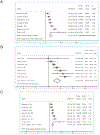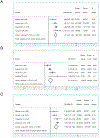Risk of chronic pancreatitis in carriers of the c.180C>T (p.Gly60=) CTRC variant: case-control studies and meta-analysis
- PMID: 37321941
- PMCID: PMC10586708
- DOI: 10.1016/j.pan.2023.05.013
Risk of chronic pancreatitis in carriers of the c.180C>T (p.Gly60=) CTRC variant: case-control studies and meta-analysis
Abstract
Chymotrypsin C (CTRC) is a digestive serine protease produced by the pancreas that regulates intrapancreatic trypsin activity and provides a defensive mechanism against chronic pancreatitis (CP). CTRC exerts its protective effect by promoting degradation of trypsinogen, the precursor to trypsin. Loss-of-function missense and microdeletion variants of CTRC are found in around 4% of CP cases and increase disease risk by approximately 3-7-fold. In addition, a commonly occurring synonymous CTRC variant c.180C>T (p.Gly60=) was reported to increase CP risk in various cohorts but a global analysis of its impact has been lacking. Here, we analyzed the frequency and effect size of variant c.180C>T in Hungarian and pan-European cohorts, and performed meta-analysis of the new and published genetic association data. When allele frequency was considered, meta-analysis revealed an overall frequency of 14.2% in patients and 8.7% in controls (allelic odds ratio (OR) 2.18, 95% confidence interval (CI) 1.72-2.75). When genotypes were examined, c.180TT homozygosity was observed in 3.9% of CP patients and in 1.2% of controls, and c.180CT heterozygosity was present in 22.9% of CP patients and in 15.5% of controls. Relative to the c.180CC genotype, the genotypic OR values were 5.29 (95% CI 2.63-10.64), and 1.94 (95% CI 1.57-2.38), respectively, indicating stronger CP risk in homozygous carriers. Finally, we obtained preliminary evidence that the variant is associated with reduced CTRC mRNA levels in the pancreas. Taken together, the results indicate that CTRC variant c.180C>T is a clinically relevant risk factor, and should be considered when genetic etiology of CP is investigated.
Keywords: Chymotrypsin; Genetic association study; Meta-Analysis; Pancreatitis.
Copyright © 2023 The Authors. Published by Elsevier B.V. All rights reserved.
Conflict of interest statement
Declaration of competing interest The authors have declared that no conflict of interest exists.
Figures




Similar articles
-
Risk of chronic pancreatitis in carriers of loss-of-function CTRC variants: A meta-analysis.PLoS One. 2022 May 20;17(5):e0268859. doi: 10.1371/journal.pone.0268859. eCollection 2022. PLoS One. 2022. PMID: 35594281 Free PMC article.
-
Comprehensive screening of chymotrypsin C (CTRC) gene in tropical calcific pancreatitis identifies novel variants.Gut. 2013 Nov;62(11):1602-6. doi: 10.1136/gutjnl-2012-302448. Epub 2012 May 12. Gut. 2013. PMID: 22580415
-
Sequence analysis of the 5' region of the chymotrypsin C (CTRC) gene in chronic pancreatitis.Pancreatology. 2025 Feb;25(1):65-69. doi: 10.1016/j.pan.2024.12.020. Epub 2025 Jan 1. Pancreatology. 2025. PMID: 39765393
-
Association between genetic variants in CYP2E1 and CTRC genes and susceptibility to alcoholic pancreatitis: A systematic review and meta-analysis.Drug Alcohol Depend. 2020 Apr 1;209:107873. doi: 10.1016/j.drugalcdep.2020.107873. Epub 2020 Jan 17. Drug Alcohol Depend. 2020. PMID: 32045777
-
Chronic pancreatitis with polycystic kidney disease: A rare coincidence?Nefrologia (Engl Ed). 2020 May-Jun;40(3):351-355. doi: 10.1016/j.nefro.2019.09.003. Epub 2019 Dec 18. Nefrologia (Engl Ed). 2020. PMID: 31862184 Review. English, Spanish.
Cited by
-
Engineering mouse chymotrypsin B1 for improved trypsinogen degradation.Sci Rep. 2025 Mar 25;15(1):10201. doi: 10.1038/s41598-025-94299-1. Sci Rep. 2025. PMID: 40133496 Free PMC article.
-
Secretagogue-induced pancreatitis in mice devoid of chymotrypsin.Am J Physiol Gastrointest Liver Physiol. 2024 Sep 1;327(3):G333-G344. doi: 10.1152/ajpgi.00310.2023. Epub 2024 Jul 9. Am J Physiol Gastrointest Liver Physiol. 2024. PMID: 38981616
-
Cellular and molecular organization of the Drosophila foregut.Proc Natl Acad Sci U S A. 2024 Mar 12;121(11):e2318760121. doi: 10.1073/pnas.2318760121. Epub 2024 Mar 5. Proc Natl Acad Sci U S A. 2024. PMID: 38442150 Free PMC article.
-
Novel chymotrypsin C (CTRC) variants from real-world genetic testing of pediatric chronic pancreatitis cases.Pancreatology. 2024 Aug;24(5):690-697. doi: 10.1016/j.pan.2024.06.003. Epub 2024 Jun 10. Pancreatology. 2024. PMID: 38876922 Free PMC article.
-
Substrate specificity of human chymotrypsin-like protease (CTRL) characterized by phage display-selected small-protein inhibitors.Pancreatology. 2023 Sep;23(6):742-749. doi: 10.1016/j.pan.2023.08.004. Epub 2023 Aug 17. Pancreatology. 2023. PMID: 37604733 Free PMC article.
References
Publication types
MeSH terms
Substances
Grants and funding
LinkOut - more resources
Full Text Sources
Molecular Biology Databases
Miscellaneous

